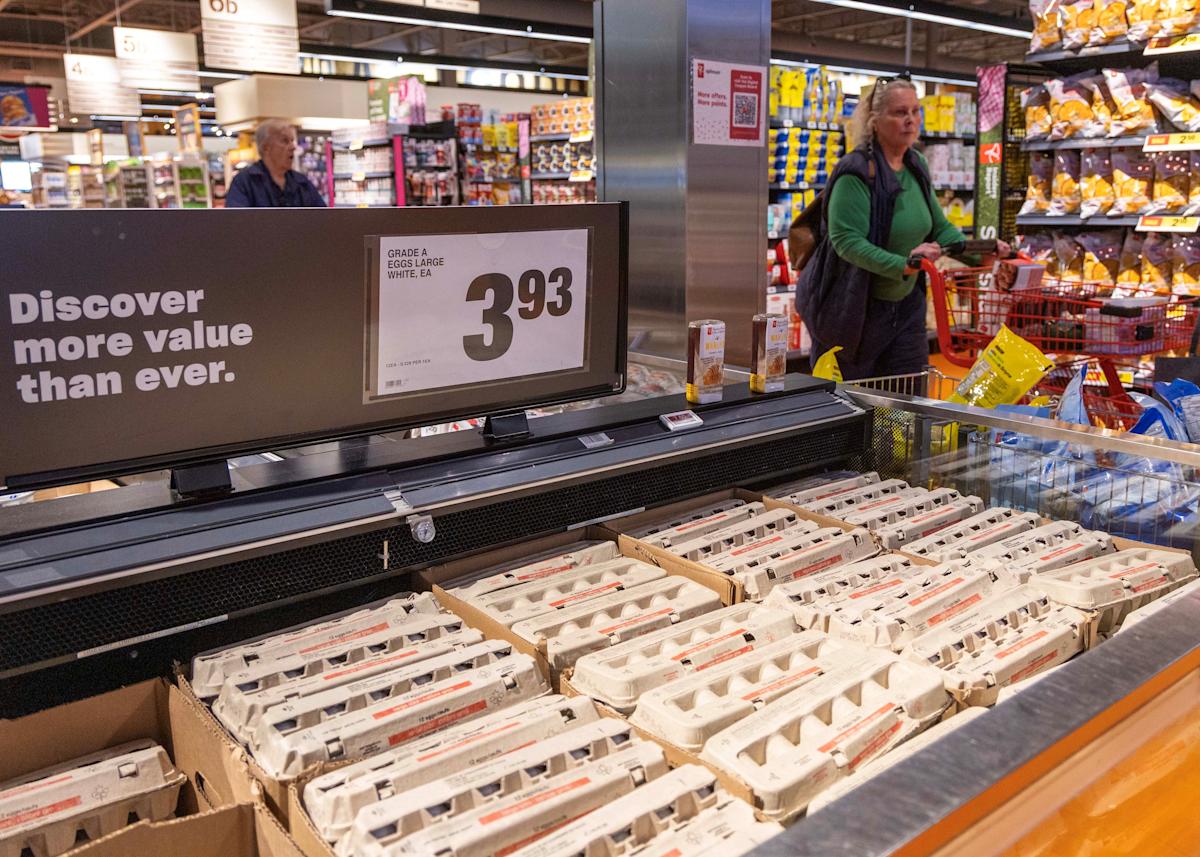Food prices in Canada drove higher in July, with grocery prices increasing 3.4 per cent from the year before. (Photo by Zou Zheng/Xinhua via Getty Images) · Xinhua News Agency via Getty Images
Canada’s inflation rate slowed in July, with the Consumer Price Index (CPI) registering 1.7 per cent growth annually, according to Statistics Canada data released Tuesday. Gasoline prices, lower than last year because of the removal of the federal consumer carbon tax, helped push inflation down, the agency said.
Tuesday’s data show “a softer trend” in the core inflation measures that the Bank of Canada (BoC) watches closely, TD Bank senior economist Andrew Hencic said in a note about the release. That trend, coupled with minimal job creation since the outset of the trade war with the United States in February, aligns with the conditions the BoC said could require an interest rate cut, he wrote.
“From our lens, we think the BoC will have room to deliver more easing later this year as the economic slack continues to build and offset inflation pressure.”
In the July data, rising grocery prices countered gasoline’s downward pull, with poor weather in coffee and cocoa-producing regions helping to push food costs up 3.4 per cent over last year.
Inflation measures excluding gas and food, however, were “tamer” in July, CIBC economist Andrew Grantham wrote in a note to clients, with today’s data overall removing “one obstacle on the path towards a potential September interest rate cut” by the BoC.
“While there is still a lot more data to be released between now and the mid-September BoC meeting (including another CPI release), today’s release is supportive of our current call for a 25-basis-point reduction at that time.”
Desjardins Group also projects a rate cut in September, with economist Royce Mendes writing that today’s data support “our thesis that many tariff-related price increases occurred in March and April, earlier than the Bank of Canada has been assuming.” Prices for core goods rose only fractionally, Mendes said, and core services rose 0.16 per cent with shelter costs removed.
“These readings suggest that neither goods nor services price growth should keep monetary officials from delivering further easing.”
Core inflation measures, which carve out the most volatile components to get a clearer view of underlying price pressures, and to which the Bank of Canada pays particular attention, remained higher, with CPI-median inching up to 3.1 per cent and CPI-trim holding at 3.0 per cent. But Grantham said that July’s data appear more positive.
“While the year-over-year rates for CPI-Trim and Median failed to decelerate and remained at or slightly above three per cent, that was largely due to base effects from a year ago,” Grantham writes. “Following the surprise acceleration earlier in the year, the recent trend in both has been softer and the three-month annualized rates have fallen back below 3 per cent, to 2.4 per cent in July.”
Story Continues
In a morning note, BMO chief economist Douglas Porter acknowledged the easing three-month trend in the core measures, but noted prices in shelter have been tenacious. Rent was up 5.1 per cent on the year, up from 4.7 per cent last month, and mortgage interest costs came down from June but, Porter says, are still a “lingering source of pressure on core” inflation. Overall, shelter prices were up 3.0 per cent from last year, according to Statistics Canada, up from 2.9 per cent year-over-year in June — “the first acceleration in shelter prices since February 2024.”
“There were no big surprises in the July inflation report, but we probably need a downside surprise at this point to prompt the BoC off the sidelines,” Porter says.
On a monthly basis, the CPI rose 0.3 per cent in July. Seasonally adjusted, it was up 0.1 per cent.
Financial industry experts had expected inflation to cool slightly to 1.8 per cent, according to consensus estimates published by BMO Economics. In a note last Friday, economist Benjamin Reitzes argued that the Bank of Canada “needs to see at least a couple of months (and probably three) of decelerating inflation before further rate cuts are on the table.”
In June, CPI increased to 1.9 per cent from 1.7 per cent the month before. Prices of gas and durable goods — such as cars and furniture — were factors in that increase.
John MacFarlane is a senior reporter at Yahoo Finance Canada. Follow him on X @jmacf.
Download the Yahoo Finance app, available for Apple and Android.

